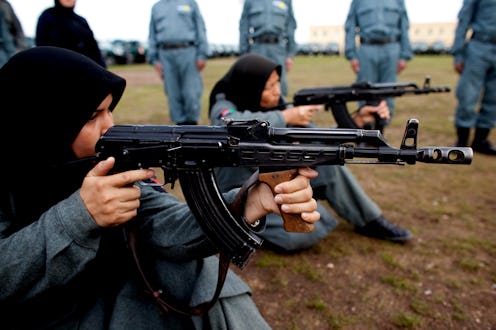News
Meet Afghanistan's First Female Police Chief
Col. Jamila Bayaz, aka the first female district police chief in Afghanistan, is confident about her job in Kabul. Bayaz, a mother of five, has been a police officer for more than 30 years. Constantly flanked by four large bodyguards, Sayaz says she is ready for whatever comes her way.
"I work day and night," Bayaz told the New York Times. "I am ready to serve, I am not scared nor am I afraid."
Police jobs in the public eye are often very dangerous for women in the country. Female cops are targeted by Taliban insurgents and are subject to harassment, their family's rejection, and are even denied bathroom facilities while on the job. A staggering 90 percent of Afghani female policewomen cite sexual harassment as a serious problem in the police force. In July, a top female police officer in Afghanistan's Helmand Province was shot on her way to work while riding on her son-in-law's motorbike. Her successor was then shot dead only months later.
Bayaz says she attracts attention wherever she goes, wearing a headscarf and pants as part of her uniform. When Afghanistan was under Taliban control, she raised her children at home. She previously tracked smugglers on the Criminal Justice Task Force, where she worked as a plainclothes officer — like most Afghan policewomen — to prevent unwanted attention. But now, her apparel is quite different.
"When I got out of my car, I spoke to my police officers on duty and all eyes were on me. It was interesting for the people to see a woman in uniform. Carrying out my duties in uniform is a lesson for others. I hope it inspires other women to wear the uniform and I hope more women become officers."
Because of the high risk, recruiting efforts in Afghanistan have been difficult to say the least. The president, Hamid Karzai, wants to employ at least 5,000 policewomen by 2014's end, to ensure the safety of Afghani women (since most are more apt to approach a female cop than a male). In 2005, there were only 180 women in the 53,400-strong force, and that number is at just 1,551 out of 157,000 as of July 2013. As the country preps for presidential elections in April, it needs to beef up on female cops to perform body searches for explosives at segregated polling stations.
But Bayaz is sticking to her guns, no matter what. Even though her family worries about her safety, she is committed to her ideals. "I would say there's no difference between a man and a woman," she says.

